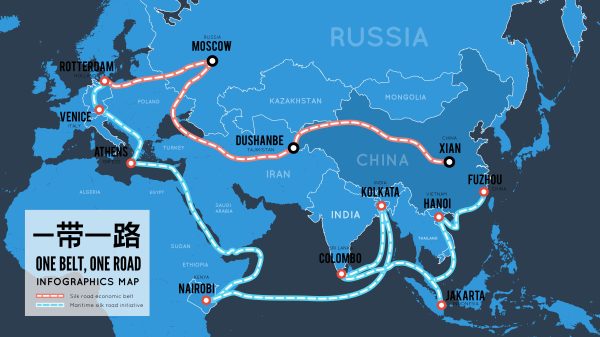The Xi Jinping authorities launched the “One Belt One Road” plan in 2013. (Image source: Adobe Stock)
[See China News on June 12, 2021](See a comprehensive report by Chinese reporter Wen Long)Xi JinpingThe authorities’ proposal of the huge “One Belt, One Road” plan has been resisted by more and more countries, saying it isdebttrap.The U.S. will be inG7 summitProposed on “One Belt One Road“Alternatives, and start with partners.
The Group of Seven (G7) summit opened in Cornwall, UK on June 11. The United Kingdom is the host of this summit, and the participants include leaders from Canada, France, Germany, Italy, Japan and the United States. The representatives of the European Union and the heads of Australia, South Africa and South Korea attended the meeting as special guests. The Prime Minister of India participated in the meeting through online video.
British Prime Minister Boris Johnson said in a speech at the opening plenary meeting. “We need to make sure that we have learned the lessons from the pandemic, and we need to make sure that we don’t repeat some of the mistakes we have undoubtedly made in the past 18 months.”
The G7 countries are all allies and mutual major trading partners, and all countries hold the same views on security and trade cooperation. Together, the G7 economies can account for about half of the global economy.
The Biden administration stated that it will announce an infrastructure financing mechanism for low- and middle-income countries, designed to compete with China’s “One Belt One Road” initiative. The initiative called “Rebuilding the World Better” will be launched with partners at the G7 Summit. A senior US government official stated that this will be “value-driven, transparent and sustainable.”
According to a report by the Voice of America on June 12, a senior US government official said: “We believe that we will defeat the’Belt and Road’ initiative by providing higher-quality options, and we will be confident in a model that reflects our shared values. .”
The official stated that the “B3W” initiative aims to mobilize private sector investment and meet the tens of trillions of dollars in infrastructure financing needs in developing countries, while meeting labor, environmental and transparency standards.
The government official expressed the hope that together with G7 partners, the private sector and other stakeholders, the United States will soon generate tens of billions of dollars for infrastructure investment in low- and middle-income countries.
Robert Daly, director of the Kissinger Institute for China-US Relations at the Wilson Center, pointed out that if these projects are fundable, lenders such as the International Monetary Fund and the World Bank will provide them with funds.
In February of this year, former US Secretary of the Navy and former Senator Jim Webb (Jim Webb) issued a document advising Washington to consider launching the US version of the “One Belt One Road” plan. “China invests in large-scale infrastructure projects around the world to increase its influence. You can do the same.”
Weber pointed out that, as an important part of the Beijing authorities’ expansion of the global strategy, it establishes economic and diplomatic ties with developing countries through the “Belt and Road” project and conducts military infiltration on the grounds of protecting the interests of these projects. However, the United States has not paid enough attention to this.
Weber believes that the Beijing authorities’ escalating military actions, diplomatic provocations, and human rights persecutions in recent years have given many developing countries more consideration for participating in China’s “Belt and Road” plan. He called on Washington to seize this opportunity and begin to attach importance to countries that are often overlooked in US foreign policy and prevent the world system from being coerced by authoritarianism, which is conducive to the health of the US diplomacy and economy.
Weber proposed that Washington implement a comprehensive and coordinated policy in Asia, Africa, and Latin America (Asia, Africa, and Latin America), integrating thoughtful diplomacy, security commitments, and project investment and participation by the American business community to fill the gaps.
Weber also believes that the U.S. can do better than China. “The U.S. has invested heavily in this area without colonial motives, and based on a more credible and more time-tested business model, it will vigorously start developing economies and improve at the same time. The U.S. economy has stimulated the further development of a global free society.”
After Xi Jinping’s authorities launched the “One Belt, One Road” plan in 2013, the official media compared this huge infrastructure development project with the ancient “Silk Road”.
The program provides loans to low-income developing countries for the construction of large-scale infrastructure from roads to ports. However, some low-income countries are in crisis due to their inability to repay their debts. Therefore, the “Belt and Road” plan is called a “debt trap” by outsiders.
Some studies have found that China’s commercial loans increase the debt risk of African countries. A research report released by the Washington Think Tank Global Development Center shows that China’s commercial loans to developing countries have shorter repayment periods and grace periods than World Bank loans, but higher interest rates. Once developing countries cannot repay their loans, they must mortgage their national resources such as land, ports, and mines to China.
Editor in charge: Xin He Source: Look at China
Short URL of this article:
All rights reserved, any form of reprinting requires Chinese authorization. It is strictly forbidden to establish a mirror website.
[Honorary Member Wanted]Streams can merge into the sea, and small kindness can achieve great love. We sincerely solicit 10,000 honorary members from Chinese people around the world: each honorary member only needs to pay a subscription fee ($68/year) per year. Becoming an honorary member of the “Watch China” website can help us break through censorship and blockade. At least 10,000 mainland Chinese compatriots have provided independent and true key information to warn them in times of crisis, saving them from the great plague and other social distress.

.
